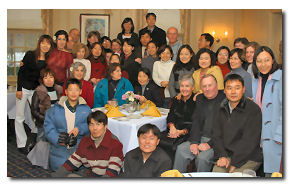Incheon teachers profit from cultural immersion and training
 |
Teachers from Incheon, South Korea, gather with their homestay families after completing their training in February. |
Sometimes CNN isn’t enough.
That was the consensus of the 20 English teachers from the Incheon school district in South Korea. The group participated in a six-week program that combined regular ELI classes and workshops on pedagogy with a vigorous schedule of cultural visits orchestrated by ELI’s Joe Matterer and Kathy Schneider, who served as program coordinators.
During the final week of the program, the group was visited by a delegation from the Incheon Ministry of Education, including superintendent Keun-Hyung Na, who oversees 250,000 students in his school district. The officials met ELI staff, visited classes and talked with participants.
The city of Incheon, which is scheduled to become a free trade zone, is eager to increase the number of its citizens with English-language skills.
“We need English to develop our economy,” Na said.
The Incheon teachers particularly enjoyed classes on American culture, living with American families and other opportunities to meet Americans.
“As an English teacher this was a great chance to know American people and the American way of life,” said Won-jun Ko, a teacher at Hag-ik High School. “This is tremendously important to me.”
Ko said he enjoyed talking with ordinary people. He visited Christiana High School in Newark, where he impressed students by describing the daily routine of an average high school student in Korea, whose school day starts early and ends around 9 pm.
“They were surprised by how stressful high school is,” he said. Ko himself was shocked to learn how American teachers could be laid off in an economic downturn.
“Teaching is a safe and stable job,” he said. “Korean teachers cannot be fired.”
Such cultural insights go beyond what you learn from TV news shows, he said.
Sun-wha Leem, a teacher at Mokhyang Elementary School who lived with a female UD professor during her stay, said she learned a lot from her homestay experience.
“Korean women sacrifice their lives for their family. Here women try to achieve what they want.”
Leem also benefited from the teaching methods classes.
“Before, I used more limited activities,” she said. “Now I have learned more energetic activities, like drama-based lessons.”
After returning to South Korea, superintendent Na expressed his satisfaction with the ELI program.
“I was impressed with the enthusiasm of the staff and the educational environment of the University of Delaware,” he wrote in an email communication. “It seems to me that the University of Delaware is one of the best places to learn English.”